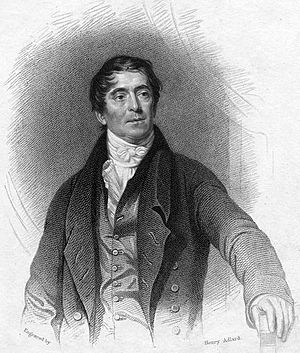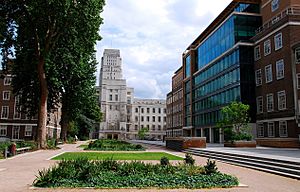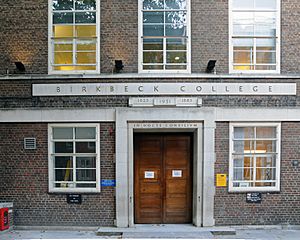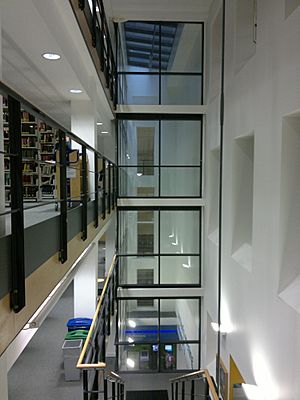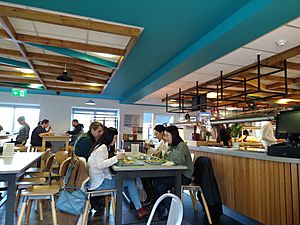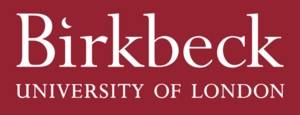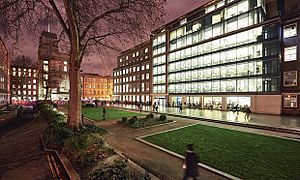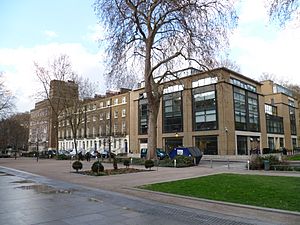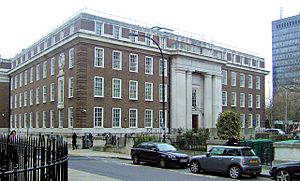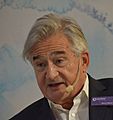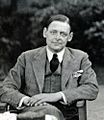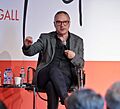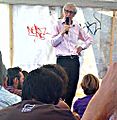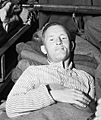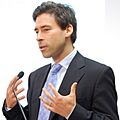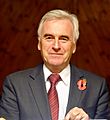Birkbeck, University of London facts for kids
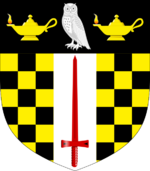
Coat of arms
|
||||||||||||||||
| Latin: Collegium Birkbeck Londiniense | ||||||||||||||||
| Motto | Latin: In nocte consilium | |||||||||||||||
|---|---|---|---|---|---|---|---|---|---|---|---|---|---|---|---|---|
|
Motto in English
|
Advice comes at night | |||||||||||||||
| Type | Public research university | |||||||||||||||
| Established |
|
|||||||||||||||
|
Parent institution
|
University of London | |||||||||||||||
| Endowment | £10.2 million (2022) | |||||||||||||||
| Budget | £108.2 million (2021–22) | |||||||||||||||
| Chancellor | The Princess Royal (University of London) | |||||||||||||||
| President | Baroness Bakewell | |||||||||||||||
| Vice-Chancellor | Sally Wheeler | |||||||||||||||
| Students | 12,245 (2015/16) | |||||||||||||||
| Undergraduates | 8,010 (2015/16) | |||||||||||||||
| Postgraduates | 4,905 (2015/16) | |||||||||||||||
| Location |
London, England, United Kingdom
|
|||||||||||||||
| Colours |
|
|||||||||||||||
| Affiliations | ACU European University Association Royal Academy of Dramatic Art Universities UK |
|||||||||||||||
 |
||||||||||||||||
Birkbeck, University of London, is a special kind of university in London, England. It is part of the larger University of London. What makes Birkbeck unique is that it mainly focuses on evening classes. This means people can study for a degree while working during the day.
The university was started in 1823 by Sir George Birkbeck. It was first called the London Mechanics' Institute. People like Jeremy Bentham and Henry Brougham helped him. Birkbeck is known for its research and for helping many people get a university education.
Birkbeck's main buildings are in Bloomsbury, a part of Central London. The university offers more than 200 different courses. These include courses for students just starting university (undergraduate) and those studying for advanced degrees (postgraduate). Birkbeck is a member of important groups like the Association of Commonwealth Universities. In 2005, its Centre for Brain Function and Development won a special award for its brain research. Many famous people have studied or worked at Birkbeck, including five Nobel Prize winners.
Contents
History of Birkbeck
How Birkbeck Started
In 1823, a doctor named Sir George Birkbeck started the "London Mechanics' Institute." He wanted to help working people learn new skills. Over two thousand people came to the first meeting. Not everyone liked the idea at first. Some people worried that educating working people would cause problems.
Two years later, in 1825, the institute moved to a new building. By 1830, girls and women were allowed to study there too. In 1858, the University of London changed its rules. This made it easier for people to take university exams. The Institute became a main place for people to study part-time.
In 1866, the Institute changed its name to the Birkbeck Literary and Scientific Institution. Later, in 1885, it moved to the Breams Building. The students also formed their own union in 1904.
Becoming Birkbeck College
In 1907, the name was shortened to "Birkbeck College." In 1913, it was suggested that Birkbeck become a full college of the University of London. This finally happened in 1920 after World War I. Birkbeck received a special Royal Charter in 1926.
In 1921, Dame Helen Gwynne-Vaughan became the college's first female professor. She taught botany. Other famous teachers during this time included Nikolaus Pevsner and J. D. Bernal.
During World War II, Birkbeck was the only University of London college that stayed in the city. In 1941, its library was hit during the war, but teaching continued. The college even held special lunchtime talks for the public.
In 1952, Birkbeck moved to its current main location on Malet Street.
Birkbeck Today
In 2002, the university started using the name Birkbeck, University of London. However, its full legal name is still Birkbeck College, University of London. In 2003, the main building was updated and reopened by The Princess Royal.
In 2006, Birkbeck received money to open a new campus in East London. This project is called Birkbeck Stratford. It works with the University of East London.
Birkbeck is the largest college of the University of London that doesn't give out its own degrees. Even though it has the power to do so, it chooses to award degrees from the University of London. It also offers many shorter courses and diplomas.
In 2022, a book called Birkbeck was published. It tells the story of the university's 200 years.
Learning for Everyone
In 1876, a group was formed to help working people get a university education. In 1988, a part of the University of London that offered courses for adults joined Birkbeck. This became the School of Continuing Education. It helped many people continue their learning journey.
Campus and Buildings
Birkbeck's main campus is in Bloomsbury, London. It is located between Malet Street and Woburn Square. Some of its departments and labs are on nearby streets. For example, the School of Arts is in Virginia Woolf's old house. This house also has the Birkbeck Cinema and the Peltz Gallery.
Many Birkbeck classes are taught in different places around Bloomsbury. This helps make education easy to reach for more students. It also helps because most classes happen at the same time in the evenings.
Birkbeck has also expanded to East London with its Birkbeck Stratford campus. This campus officially opened in 2013. In 2021, Birkbeck started using a newly renovated building on Euston Road. It also began leasing Student Central in 2021, which opened for students in 2022.
How Birkbeck is Organized
Birkbeck is divided into three main groups called faculties. These faculties have different schools within them:
- Faculty of Business and Law
- Birkbeck Business School
- Birkbeck Law School
- Faculty of Humanities and Social Science
- School of Creative Arts, Culture and Communication
- School of Historical Studies
- School of Social Sciences
- Birkbeck Centre for Counselling
- Faculty of Science
- School of Computing and Mathematical Sciences
- School of Natural Sciences
- School of Psychological Sciences
What Students Study and Research
Research and Teaching at Birkbeck
The Birkbeck Institute for the Humanities (BIR) was started in 2004. It aims to discuss important public topics through talks and events. It also helps different academic areas work together on research.
Birkbeck also works with other universities on research. For example, it joined with the Institute of Education to create the London Knowledge Lab. This lab studies how technology helps people learn.
The London Consortium is another partnership. It offers advanced degrees in humanities and cultural studies. Famous people like Tilda Swinton and Salman Rushdie have been involved.
Birkbeck also works closely with University College London (UCL). They have joint research centers. These include centers for Earth and Planetary Sciences, Educational Neuroscience, and Structural and Molecular Biology.
Science research at Birkbeck has a strong history. Famous scientists like David Bohm, who studied Quantum mechanics, and Nobel Prize winners Aaron Klug and Derek Barton worked here. Kathleen Booth, a computer scientist, wrote the first assembly language. Birkbeck is part of important centers for studying protein structure and Bioinformatics.
Birkbeck's research has been highly rated. In 2008, it was in the top 25% of UK universities for research quality. Subjects like Earth Sciences, Psychology, History, and History of Art were ranked among the best in the country. In 2021, Birkbeck did very well in English Language & Literature and Art and Design.
University Rankings
| National rankings | |
|---|---|
| Complete (2021) | N/A |
| Guardian (2021) | N/A |
| Times / Sunday Times (2021) | N/A |
| Global rankings | |
| QS (2021) |
408= |
| THE (2021) | 301-350 |
| British Government assessment | |
| Teaching Excellence Framework | Silver |
Birkbeck's Centre for Brain Function and Development won The Queen's Anniversary Prize in 2005 for its brain research. In 2010, Birkbeck was considered for the Times Higher Education University of the Year Award.
In 2021, Birkbeck was ranked 95th in the world for Psychology by the Times Higher Education World University Rankings. It is also often in the top 100 worldwide for English Language & Literature and Philosophy by QS World University Rankings. Overall, Birkbeck is ranked among the top 350 universities globally.
In 2018, Birkbeck decided to stop taking part in some UK university rankings. This was because the ranking methods didn't fairly judge universities like Birkbeck, which have a unique evening teaching model.
Birkbeck Students' Union
The Birkbeck Students' Union (BBKSU) was started in 1904. It was one of the first members of the National Union of Students.
The Students' Union is run by students for students. It helps students with many things. It offers different student groups and sports clubs. It also provides support, advice, and chances to volunteer. All students are automatically members when they join the college.
Notable People from Birkbeck
Many interesting and important people have studied or worked at Birkbeck. These include Nobel Prize winners, famous historians, writers, and politicians.
-
Derek Barton, a Nobel Prize winner for Chemistry in 1969.
-
Antony Beevor, a well-known military historian.
-
Annie Besant, a British activist for women's rights.
-
Patrick Blackett, a professor of physics and Nobel Prize winner in Physics in 1948.
-
David Bohm, a physicist and author.
-
Ed Davey, a British Member of Parliament.
-
T. S. Eliot, a lecturer in English and Nobel Prize winner in Literature in 1948.
-
Marcus Garvey, a political leader.
-
Bear Grylls, an adventurer and TV presenter.
-
Eric Hobsbawm, a historian.
-
William Joyce, a politician.
-
Aaron Klug, winner of the 1982 Nobel Prize in Chemistry.
-
Ramsay MacDonald, the first Labour Prime Minister of the United Kingdom.
-
John McDonnell, a Member of Parliament.
-
Lisa Nandy, a British Member of Parliament.
-
Gloria De Piero, a journalist and former Member of Parliament.
-
Roger Penrose, a physicist and winner of the 2020 Nobel Prize in Physics.
-
Delcy Rodríguez, the vice president of Venezuela.
-
Roger Scruton, a philosopher.
-
Sidney Webb, 1st Baron Passfield, an economist.
-
Helen Sharman, the first British person in space.
See also
 In Spanish: Birkbeck College para niños
In Spanish: Birkbeck College para niños


